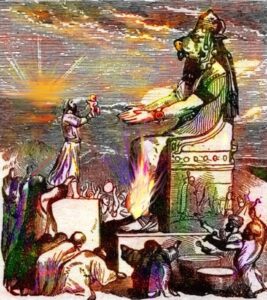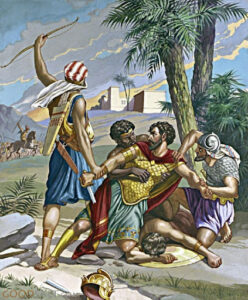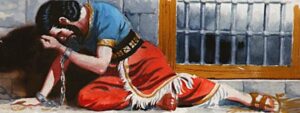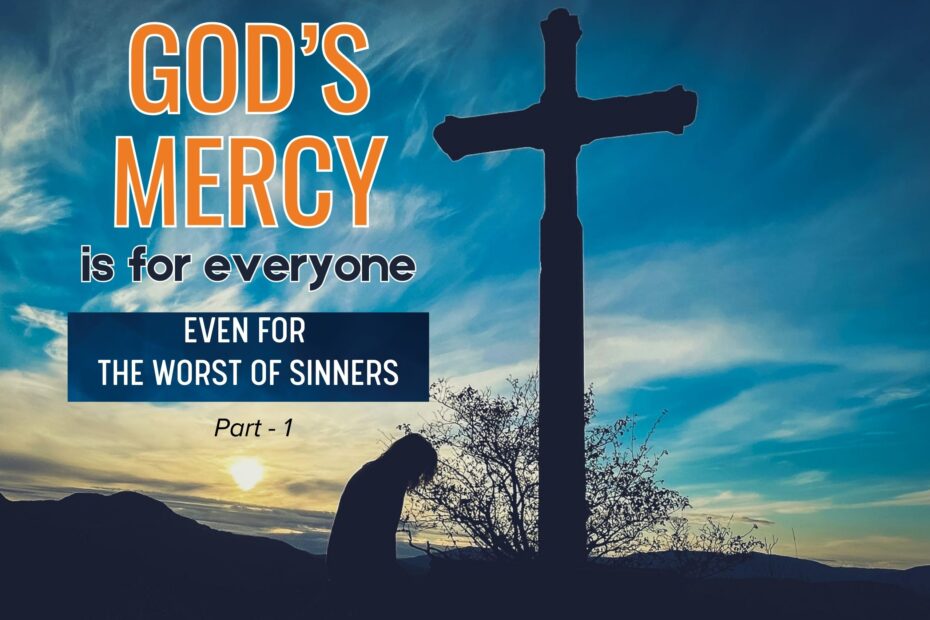Man by nature is sinful, but when that sinfulness causes him to turn to God in all sincerity, the floodgates of heaven are opened and there is an outpouring of God’s abundant mercy. The experience is so profound that it transforms the soul and gives it a renewed sense of direction in life.
We find many instances in the Bible where God shows mercy even to the worst of sinners. In fact, we see this attribute of God even in the Old Testament – the part of the Bible, which speaks mostly about the Law. One classic example of the worst of sinners who experienced God's mercy is King Manasseh of Judah. He did all the wicked things to stir up the anger of God. He worshipped the stars and even built pagan altars in the Temple. He killed so many innocent people that the streets of Jerusalem were flowing with blood. He even sacrificed his son as a burnt offering. With his idols, he led the people of Judah into sin. In short, he sinned greatly against the LORD and stirred up his anger. (2 Kings 21:2-16).

It is worth noting how God dealt with a sinner who had gone to such an extent of doing evil. Without any doubt, we can say that Manasseh deserved to go straight to hell. God should have killed him instantly for having led all His people into idolatry. But He didn’t do that. This shows us how patient He is in dealing with our sinful nature. Having such patience is in itself an act of mercy. We are told that He warned both Manasseh and the people of Judah even though He knew in advance that they would not listen. Although the LORD warned Manasseh and his people, they refused to listen. (2 Chronicles 33:10). In our lives too, when we turn away from Him, He warns us first through His Word, through spiritual guides, and others around us. That is nothing but the mercy of Our God. Every time we hear His Word and are convicted in our hearts about our sins, it is an act of mercy of God. But very often we are stubborn like Manasseh and the people. We refuse to listen.
Now, although Manasseh and the people turned a deaf ear to God, He did not destroy them. Instead, He allowed a problem in their lives hoping they would repent and turn to Him… So the LORD let the commanders of the Assyrian army invade Judah. They captured Manasseh, stuck hooks in him, put him in chains, and took him to Babylon. (2 Chronicles 33:11). God does the same thing in our lives too. When we stubbornly refuse to listen to His Word and obey it, He allows problems in our lives in order to lead us to repentance. (Proverbs 20:30, 2 Corinthians 7:10). That is again the mercy of God. He does not intend to do us harm. If that was His intention, we would have been burning in the fires of hell. That is why, instead of getting angry and bitter against Him, we must recognise such problems, sufferings, etc., to be acts of mercy of a God who loves us.

Manasseh lost everything in an instant. But like the prodigal son, he began to reflect on how good God had been to him in the past. In fact, he was a witness to all the good that God had done in the life of his father Hezekiah who ruled Judah before him. As a king’s son, he received all the benefits – the palace, the wealth, the royal treatment. And to add to it all, God made him succeed his father as king. Everything that belonged to his father became his. God had been very gracious to him; but he had taken Him for granted. Perhaps all these thoughts led Manasseh to repent… In his suffering he became humble, turned to the LORD his God, and begged Him for help. (2 Chronicles 33:12). Note the words ‘his God’. True repentance is when I think about all that I have done to my God after having received so many benefits from Him. Instead of getting bitter against Him, I humble myself and beg Him for help.
It is worth reading the prayer of repentance that Manasseh makes to God… Your anger is more than sinners can endure. But the mercy you promise is also greater than we can understand or measure. For you are the Lord Most High; you are patient and show mercy and compassion. You make our punishment easier to bear when we suffer for our sins. O Lord, in your great goodness and mercy you promise forgiveness and salvation to those who repent of their sin against you. (Prayer of Manasseh 5-7). In this part of the prayer, Manasseh recounts how God had shown mercy to people in the past. In other words, he praises God for His mercy. This helps because when we recount how God has been merciful in the past even to the worst of sinners, we come to believe more and more that He is a merciful God. The more we believe, the more confidence we develop to approach the Mercy Seat of God.

Next, Manasseh considers himself to be the worst of sinners… I have committed more sins than there are grains of sand along the seashore. They are so many, Lord, they are so many. I have done so much that is wrong that I am not worthy to turn my face towards heaven. But now I bow in deep humility, praying for your mercy. I have sinned, Lord, I have sinned; I confess the wicked things I have done. (Prayer of Manasseh 9-12). This is what happens in true repentance. There are no excuses, no room for self-righteousness, no blaming others. Instead, the person takes full responsibility for his sins and confesses them before God.
Finally, Manasseh begs for forgiveness… I beg you, Lord, I earnestly pray: forgive me, forgive me. (Prayer of Manasseh 13). Note the response of God… God accepted Manasseh's prayer and answered it by letting him go back to Jerusalem and rule again. This convinced Manasseh that the LORD was God. (2 Chronicles 33:13). What a profound experience that was. Surely Manasseh never expected to return to Jerusalem, leaving aside the possibility of being restored as king. But God did both to show that He is truly merciful and gracious to those who humble themselves before Him and beg Him for mercy. That was what He told Moses, the one through whom the Law was handed down… “The LORD, the LORD, a God merciful and gracious, slow to anger, and abounding in steadfast love and faithfulness.” (Exodus 34:6). In fact, He said this before renewing the covenant with Israel based on the 10 commandments (of which they had already broken the very first one by worshipping the bull calf). The renewal of the covenant was a display of God’s abundant mercy even as the Law was affirmed a second time. Isn’t that what happens each time we confess our sins and receive absolution from the priest? His mercies endure forever.

Experiencing the abundant mercy of God is one of the most beautiful things that can happen to man. However, God offers that mercy only through His Son Jesus. As St. John writes... Christ Himself is the means by which our sins are forgiven, and not our sins only, but also the sins of everyone. (1 John 2:2). It is worth noting that the chapter describing the wonderful story of God’s abundant mercy show to Manasseh is chapter number 33. As we know, Jesus lived on this earth for 33 years. In a way, the story of Manasseh in the Old Testament was pointing to the person of Christ through whom God would open the floodgates of heaven and pour out His mercy even upon the worst of sinners.

